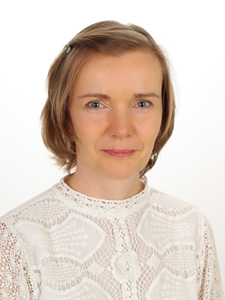Dr Magdalena Szechyńska-Hebda
Associate Professor

Research interests
- Systemic acquired acclimation, systemic acquired resistance, network acquired acclimation.
- Abiotic and biotic stress responses.
- Remote sensing: chlorophyll a fluorescence, thermal imaging.
- Geopolymer for ecological application.
Higher education and employment history
- MSc degree at the University of Agriculture in Kraków (1998).
- Research Assistant at the F. Górski Institute of Plant Physiology Polish Academy of Sciences (1999–2004).
- PhD degree at the University of Agriculture in Kraków (2004).
- Assistant professor at the F. Górski Institute of Plant Physiology, PAS (2004–2006).
- Assistant professor (Forskare) at Stockholm University, Sweden (2006–2008).
- The scientific specialist at the Warsaw University of Life Sciences (2009–2014).
- Habilitation at the Jagiellonian University (2015).
- Associate professor at the F. Górski Institute of Plant Physiology, PAS (2015–2021).
- Deputy director for research at the Plant Breeding and Acclimatization Institute – National Research Institute (2017–2023).
- Acting director at the Plant Breeding and Acclimatization Institute – National Research Institute (2021).
- Associate professor at the W. Szafer Institute of Botany, PAS (since 2023).
Membership and awards
- Member of the Scientific Council of the Prof. Wacław Dąbrowski Institute of Agricultural and Food Biotechnology – State Research Institute (since 2019).
- Member of the Committee of Agronomic Sciences, the Department II of Biological and Agricultural Sciences of the Polish Academy of Sciences (since 2020).
International experience
- The Netherlands (2003–2004) – 6-month fellowship at Wageningen University.
- Sweden (2006–2008) – a two-year stay as an assistant professor at Stockholm University.
- Germany (2015–2016) – 7-month fellowship at the University of Konstanz.
Research projects (selected)
- Signal transduction during cold-induced resistance of triticale to the fungal pathogen Microdochium nivale (2010–2012); grant no. 595/N-COST/2009/0, National Science Center – project leader.
- The use of poplar lines with an increased potential for biomass growth and improved chemical composition of wood in the technology of paper and biofuel production (2013-2016) PBS1/A8/16/2013 (WOODTECH), National Centre for Research and Development (PI, coordinator).
- Alternative factors reducing the phenomenon of albinism of plants regenerated from androgenic cultures of wheat and triticale (2015-2020) HORhn: 801-PB-14/15, Ministry of Agriculture and Rural Development (PI, coordinator).
- Physiological and genetic markers of spring wheat resistance to drought in terms of interactions occurring in the rhizosphere (2018-2020) HOR.hn.802.15.2018, Ministry of Agriculture and Rural Development (PI, coordinator).
- Application of the near remote sensing and artificial neural networks in the diagnosis and assessment of crop health (2021-2022) 000.34.DDD.6509.00107.2019.07, "Cooperation" of the Rural Development Program for 2014 – 2020 (scientific coordinator, PI on behalf of the consortium partner IHAR-PIB). .
Recent publications (selected)
Dikici B., Say Y., Zhao X., Niinomi M., Szechyńska-Hebda M. 2024. Investigation of in-vitro bioactivity, electrochemical corrosion, wettability and adhesion properties of bioglass-based coatings modified with Y2O3 and Zr on novel β-type Ti-30Zr-5Mo alloys. Surface and Coatings Technology 494: 131335. DOI
Golka W., Szechyńska-Hebda M., Golka A., Góral T., Bomberski A., Kowalska J. 2024. System oceny zdrowotności zbóż dla gospodarstw rolnych. Zagadnienia Doradztwa Rolniczego 115: 98–118.
Golka W., Szechyńska-Hebda M., Golka A., Kowalska J., Góral T., Bomberski A. 2024. Analiza systemu Teledis w ocenie zdrowotności zbóż. Zagadnienia Doradztwa Rolniczego 116: 64–83.
Szechyńska-Hebda M., Hebda M., Doğan-Sağlamtimur N., Lin W.-T. 2024. Let's print an ecology in 3D (and 4D). Materials 17: 2194. DOI
Bernacki M.J., Mielecki J., Antczak A., Drożdżek M., Witoń D., Dąbrowska-Bronk J., Gawroński P., Burdiak P., Marchwicka M., Rusaczonek A., Dąbkowska-Susfał K., Strobel W.R., Mellerowicz E.J., Zawadzki J., Szechyńska-Hebda M., Karpiński S. 2023. Biotechnological potential of the stress response and plant cell death regulators proteins in the biofuel industry. Cells 12: 2018. DOI
Karpiński S., Szechyńska-Hebda M. 2023. Systemic acquired acclimation, network acquired acclimation and cellular light memory in plants – Molecular, biochemical, and physiological mechanisms. In: R. Mittler, F. Van Breusegem (eds.). Oxidative stress response in plants. Advances in Botanical Research, 105. Academic Press, London: 277–310. DOI
Ziejewska C., Grela A., Łach M., Marczyk J., Hordyńska N., Szechyńska-Hebda M., Hebda M. 2023. Eco-friendly zeolites for innovative purification of water from cationic dye and heavy metal ions. Journal of Cleaner Production 406: 136947. DOI
Doğan-Sağlamtimur N., Bilgil A., Ertürk S., Bozkurt V., Süzgeç E., Akan A.G., Nas P., Çetin H., Szechyńska-Hebda M., Hebda M. 2022. Eco-geopolymers: Physico-mechanical features, radiation absorption properties, and mathematical model. Polymers 14: 262. DOI
Kurek I., Florek E., Gozdur W., Ziejewska C., Marczyk J., Łach M., Korniejenko K., Duży P., Choińska M., Szechyńska-Hebda M., Hebda, M. 2022. Foamed eco-geopolymer modified by perlite and cellulose as a construction material for energy-efficient buildings. Energies 15: 4297. DOI
Marczyk J., Ziejewska C., Korniejenko K., Łach M., Marzec W., Góra M., Dziura P., Sprince A., Szechyńska-Hebda M., Hebda M. 2022. Properties of 3D printed concrete-geopolymer hybrids reinforced with aramid roving. Materials 15: 6132. DOI
Szechyńska-Hebda M., Ghalami R.Z., Kamran M., Van Breusegem F., Karpiński S. 2022. To be or not to be? Are reactive oxygen species, antioxidants, and stress signalling universal determinants of life or death? Cells 11: 4105. DOI
Szechyńska-Hebda M., Lewandowska M., Witoń D., Fichman Y., Mittler R., Karpiński S.M. 2022. Aboveground plant-to-plant electrical signaling mediates network acquired acclimation. Plant Cell 34: 3047–3065. DOI
Wąsek I., Dyda M., Gołębiowska G., Tyrka M., Rapacz M., Szechyńska-Hebda M., Wędzony M. 2022. Quantitative trait loci and candidate genes associated with freezing tolerance of winter triticale (× Triticosecale Wittmack). Journal of Applied Genetics 63: 15–33. DOI
Ziejewska C., Marczyk J., Korniejenko K., Bednarz S., Sroczyk P., Łach M., Mikuła J., Figiela B., Szechyńska-Hebda M., Hebda M. 2022. 3D printing of concrete-geopolymer hybrids. Materials 15: 2819. DOI






